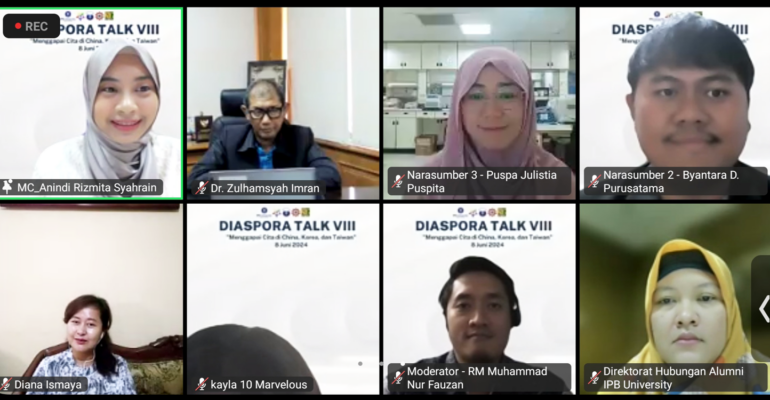IPB University Alumni Share Insight on Education in China, Korea and Taiwan

IPB University through the Alumni Association Council (DHA) in synergy with the Central Leadership Council of the IPB University Alumni Association (DPP HA) and SEAMEO Biotrop held Diaspora Talk VIII, with the theme “Achieving Dreams in China, Korea, and Taiwan”, online on 8/06.
The forum was intended to encourage IPB University students to continue their studies abroad. In addition to expanding global cooperation, it is hoped that the diaspora activity will boost the name of IPB University in the eyes of the world and increase the value of the Unit Performance Indicator (IKU).
The activity invited three alumni of IPB University namely Dr Surinah, a lecturer at Xiamen University; Byantara D Purusatama Ph D, a researcher at the Institute of Forest Science, Kangwon National University; and Puspa J Puspita, who is now a S3 student at the Graduate Institute of Biomedical Science Chang Gung University, Taiwan.
Dr Surinah said that the costs required to study in China, especially Xiamen, are quite rational. The living expenses are also not that expensive. Master’s or doctoral students are given open opportunities to get scholarships so that tuition and living costs can be covered.
“Besides being supported by scholarships from the Chinese government and universities, students can also apply as teaching assistants or researchers to earn extra money,” she explained.
Meanwhile, Byantara explained that studying in Korea will provide experience of qualified university facilities to support the competence of its students.
“Kangwon National University gives its students the option to study in English. The scholarships offered are also not differentiated from local students,” he said.
Puspa J Puspita said that China, Korea, and Taiwan have similar work ethics as modern countries. So, prospective students who are interested in one of the three countries will have a similar experience.
She mentioned the advantages of studying in Taiwan are a better standard of living, superior quality of education, diverse culture and students can get better job opportunities.
“The first thing we have to prepare is strong motivation, followed by diligently finding out about the destination university and a plan regarding the financing of studying there,” Puspa explained. (MW/Lp) (IAAS/RUM)



